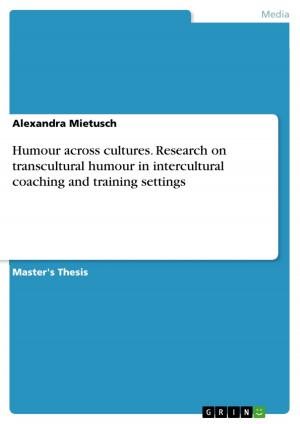| Author: | Martin Basch | ISBN: | 9783640427208 |
| Publisher: | GRIN Publishing | Publication: | September 16, 2009 |
| Imprint: | GRIN Publishing | Language: | English |
| Author: | Martin Basch |
| ISBN: | 9783640427208 |
| Publisher: | GRIN Publishing |
| Publication: | September 16, 2009 |
| Imprint: | GRIN Publishing |
| Language: | English |
Seminar paper from the year 2009 in the subject English Language and Literature Studies - Linguistics, grade: 2,7, University of Paderborn (Institut für Anglistik und Amerikanistik), course: Sociolinguistics, language: English, abstract: The field of sociolinguistics deals with the relationship between language and society. According to the commentary for the seminar, 'sociolinguists study the social and situational variables that govern variation within a language.' Pidgins and Creoles seem to be very interesting and fascinating for sociolinguists because this topic contains several areas of research like the origin of language, language loss, social contact and language prestige and definitely the rapid development and change of these languages. The development of Pidgins and Creoles has a long history. It is said to have started with the European colonization overseas in the fifteenth century, although it is supposed that there must have been lots of language contact before. 'Indeed, language contact seems likely to be nearly as old as language itself' (Holm 2000: 14). Mark Sebba does therefore give his book the title 'Contact Languages' and the subtitle is 'Pidgins and Creoles'. It is about the contact between people speaking different languages who need a certain language to get in contact. An example therefore is 'Russennorsk' that developed from the need of Russian sailors and Norwegian fishermen who needed to communicate somehow (Singh 2000: 2). However, this language does not exist any longer and has died. Research questions would be: Why did this 'language' die or how did it develop; which language was responsible for lexicon and which one for grammar; were there any grammatical rules at all? In the first chapter, I will give definitions and explain important terminology. After that, I will deal with several theories of the genesis of Pidgins and Creoles and how the development of the 'new' language from the beginning to a Post Creole Continuum does proceed. In the final chapter, I will exemplary describe the Spanish-based Creole language Papiamentu in detail.
Seminar paper from the year 2009 in the subject English Language and Literature Studies - Linguistics, grade: 2,7, University of Paderborn (Institut für Anglistik und Amerikanistik), course: Sociolinguistics, language: English, abstract: The field of sociolinguistics deals with the relationship between language and society. According to the commentary for the seminar, 'sociolinguists study the social and situational variables that govern variation within a language.' Pidgins and Creoles seem to be very interesting and fascinating for sociolinguists because this topic contains several areas of research like the origin of language, language loss, social contact and language prestige and definitely the rapid development and change of these languages. The development of Pidgins and Creoles has a long history. It is said to have started with the European colonization overseas in the fifteenth century, although it is supposed that there must have been lots of language contact before. 'Indeed, language contact seems likely to be nearly as old as language itself' (Holm 2000: 14). Mark Sebba does therefore give his book the title 'Contact Languages' and the subtitle is 'Pidgins and Creoles'. It is about the contact between people speaking different languages who need a certain language to get in contact. An example therefore is 'Russennorsk' that developed from the need of Russian sailors and Norwegian fishermen who needed to communicate somehow (Singh 2000: 2). However, this language does not exist any longer and has died. Research questions would be: Why did this 'language' die or how did it develop; which language was responsible for lexicon and which one for grammar; were there any grammatical rules at all? In the first chapter, I will give definitions and explain important terminology. After that, I will deal with several theories of the genesis of Pidgins and Creoles and how the development of the 'new' language from the beginning to a Post Creole Continuum does proceed. In the final chapter, I will exemplary describe the Spanish-based Creole language Papiamentu in detail.















